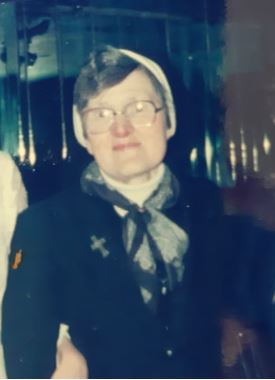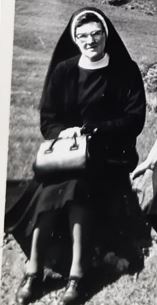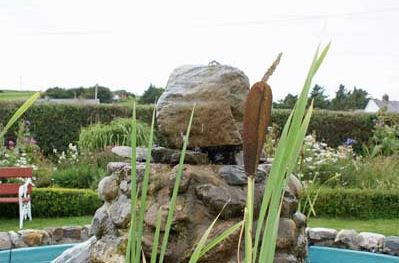“The past is a foreign country; they do things differently there.” This quotation by L.P. Hartley, reminds us of the human desire to make connections with earlier generations, and to treat such sacred history appropriately. Present day media can easily trivialise what might in other days have engendered more respect. However, in the story presented here, we find a retelling of the past that is refreshing, healing and heart-warming.
Noelle Lynskey is a past student of the Mercy schools in Strokestown. When she returned to the classroom after her father’s death, at the tender ago of ten, she was consoled to meet a loving presence. Her teacher, Sister Brigid, was someone Noelle describes as, “a saint in my life.” Even though Sister Brigid died in 1990, the “wise and maternal” impression she left on Noelle endures. She imparted factual knowledge about such as the sugar factories in Ireland, declensions of Irish verbs, and the “strange names of the deserts of Africa,” accompanied by a sweepingly dramatic telling of such tales as “Heidi.”
 Sr. Brigid at Noelle’s wedding
Sr. Brigid at Noelle’s wedding
The “cures and treats” secreted in Sister Brigid’s pockets are remembered, perhaps being an influence on Noelle’s career as a pharmacist. On another dimension, Sister Brigid’s love of stories had a lasting literary influence on Noelle, having special resonance in the workshops she gives in Creative Writing. Living in Portumna, Co Galway, this much-appreciated activity takes place in the Mercy organic centre, An Gáirdín. Now it is Noelle who sweeps others “up and away” to their own mountains. Sister Brigid lies buried in the Summerhill convent graveyard, where “the graves are lined up in rows” but she still soars through Noelle’s testimony to the positive legacy of what is good from the past, that foreign country.
Listen to the spoken piece by clicking here.
Suzanne Ryder
Western Province
The written piece can be read here:
The first day of February was the day I enjoyed most in my last years at primary school. Our compassionate teacher for 5th and 6th class in Strokestown’s convent was Sr. Brigid and on February 1st we celebrated the feast day of the saint named after our nun, as I thought. We had chocolate, sweets and the treat of art and craft day with no homework.
Our Brigid, the nun was a woman ahead of her time, empowering all us young girls to have dreams and ambition, encouraging us to be the best we could be and all of us pupils in class felt we were each special to her.
Her love of words lives on in me to this day. Descriptive passages from the books she recommended us to read were transcribed and collected in copies. They were references for future stories and essays she assigned to us. She swooped us up and away to the slopes of the Alps, where the “A soft, light morning breeze blew deliciously across the mountain, gently stirring the bluebells that still remained of the summer’s wealth of flowers, their slender heads nodding cheerfully in the sunshine. Overhead the great bird was flying round and round in wide circles. Heidi looked about her first at one thing and then at another. Her eyes were alight with joy.” And our eyes would alight with joy too.
Through Sr. Brigid’s patient repetition, we learned the list of sugar factories in Ireland, the declension of Irish verbs, the strange names of the deserts of Africa and we accompanied all the cattle home with Mary on The Sands of Dee.
 Sr. Brigid in her habit
Sr. Brigid in her habit
The pockets of her habit and the shelves of her expansive desk held cures and treats. From mercurochrome for the grazed knees to a clove drop for the torn tights, from the pictures and quotes on little cards she had stashed for special moments, her wise, maternal manner held sway at a time when punishment was often on someone else’s desk.
And the name Brigid, bestowed on her as she was Professed back in 1937 was aptly chosen. At a time when women played a subservient role to the church and state, her dedication to her sisterhood in the Mercy Convents of Elphin Diocese and her natural talent for teaching ensured that those who took refuge in her long black habit found nourishment for the soul and the mind.
In her more pensive moments, she sat, hands together, kneading her palms in a circular fashion. When I returned to school after my 10th birthday following my father’s funeral, the comfort of those hands and her gentle company has stayed with me half a century later. Later, I often skipped from the adjoining secondary school into the yard where she was overseeing her latest brood of lucky girls, just to stand in her presence. Her assurance settled my sometimes shaky self.
We never knew how she spent her summer holidays except for the pilgrimage that all nuns made to Mullaghmore for the sea air. Last year, I walked the Garden of Peace created beside the convent there and pictured her walking the paths, reciting her prayers and taking in the sounds of the sea, sky and nature.
 Fountain at the centre of the Garden of Peace
Fountain at the centre of the Garden of Peace
I wondered how lonely she may have been when the stretch of summer days meant all her children were far away from her and a whole batch of them moving on to secondary school.
When I moved away from my home town, so did she and I would occasionally visit the parlour of her newest convent home. Every February 1st, I sent wishes her way and we exchanged Christmas cards for many years. She was a guest at my wedding but sadly only lived a number of years after that and died in 1990.
At least once a year, I make a detour on my road trips to walk the shrub lined path into the nun’s graveyard not far from the Shannon in Summerhill, Athlone. All the crosses are lined up in rows inscribed with the names of generations of nuns. There is a serenity to the place and in some sense I feel the assurance that Sr. Brigid, a powerful teacher and kindest of women, is still in my corner.
On this February 1st I will fold my rushes into the traditional shape of the St. Brigid’s cross and on the evening before, I will hang a scarf out for my Brat Bride to be blessed. I’ll send a wish that the pupils crossing thresholds into classrooms will be greeted by eyes that are kind, a head bursting with words and a teacher that will open doors to the descriptive passages of life through learning.
Words as spoken by Noelle Lynskey in her piece on Sunday Miscellany, RTE Radio 1


